#18 RUI PALHA, Lisbon (Portugal) Street Photographer
Leica Liker is honored to have RUI PALHA, a Lisbon (Portugal) Street Photographer as our #18 guest.
As you might guess, I often scour the web in search of images that touch my heart. I will drop whatever I am doing to find out more. I distinctly remember seeing the image below on Flickr. It instantly drew my attention. It was like a movie still.

The director couldn’t have done a better job, starting with the window frame and the scratched and worn glass from which we look through. The actor’s hand in pocket, the other holding a newspaper, keeping it close to himself; The hunch – something weighing heavy on his mind; The backlight putting him in silhouette giving him an anonymous feel – perhaps it’s what he’s feeling; People ignoring him – what life often is about – you’re on your own… I was moved by its simplicity and its complex emotion of loneliness.
So I was thrilled to find that it wasn’t just a one hit wonder but part of a whole body of work from a true humanist.

Rui’s images seem to be devoted to that independent soul. He is drawn to the loner, the one who stands out from the crowd. Man or woman against the environment; against the world. The underdog. Rui has a connection to them. It’s deep in his Portuguese soul. And he wants us to share the humanity of his “people”- the way they conduct their lives.

When I spoke with Rui, I asked him about this recurring theme. He told me indeed it is something he yearns for. He believes solitude is a prevalent condition not only in Portugal but throughout society. People are generally lonely in crowds. It’s a sad fact of life. A state of affairs that we must live with. There’s even a Portugese term for it – “Fado” which literally means ‘fate’. It’s a Portuguese national symbol really.

FADO: a type of Portuguese singing, traditionally associated with pubs and cafés, that is renowned for its expressive and profoundly melancholic character.
The singer of fado… speaks to the often harsh realities of everyday life, sometimes with a sense of resignation, sometimes with the hope of resolution. – Encyclopedia Britannica
What I admire is Rui’s ability to juggle between street photography and street portraiture. He’s able to give us the beautifully lit and composed master shot- the overall observation and then come in for the close-up – to catch the quiet humanity of a person.
Most street photographs and portraits convey something of strangers in the moment. But many of Rui’s images come from deep empathy and sharing of an unforgettable life. I love to see them as a collection because together, they tell us a story that transcend the photographic medium and gives us a glimpse into precious souls.

Here is my interview with RUI PALHA:
Nick Name: None
Currently living in: Lisbon, Portugal
Motto: Live the day like it was the last day.
Street Photographer since: Photography has been a hobby from 13 years of age, with great interruptions up to 2001. Since then, I have devoted myself to street photography almost all the time.

How did you get into photography in the first place? I loved photographing since I was 13 years old. I even had my own dark room. Many, many years ago I invited all of my colleagues to photograph with me in the streets. Over the years working, I saw my friends become mad, become crazy. I ran away to escape. Instead of watching tv or going to the movies, I photographed the streets. I always worked with multi-disciplinary teams in my main job (mainframe computer technology advisor). I created a union between us via photography. I organized the groups to walk the streets during the weekends or breaks from hard work using the same type of film – after we developed the film we met to see the results of the images of the same place – small places. It is always amazing to see the results of shooting in the same place. It’s different from each person.
Profession/Job: Retired data processing and technology adviser
Websites:
http://www.ruipalha.com/
http://1x.com/member/ruipalha
http://www.fineart-portugal.com/author/1405
http://www.flickr.com/photos/ruipalha/
Book: “Street Photography”

What was your first camera? I remember very well… a small Minolta 16mm. The negative was small and very thin. I was 13 years old and I loved that camera. I learned a lot using it. I wrote down every shot, time, hour, sunny or not, the exposure and afterwards I developed and saw the errors I made- lots of errors. We only learn from errors. I make them still. It’s awful. You spend a whole day in the streets. You think you can’t fail and when you put up the photos in the computer they all look terrible. You can’t fix every shot or moment that was important for you. As a result, very often I would delete the whole card because all I wanted was that moment, which I didn’t get. Fortunately we are not perfect. Otherwise life would be too boring.

Favorite Street Camera & Lens: I don’t have a favorite street camera. I use several cameras in the streets depending on what I pretend to do each day. Lately I have been using a Sony RX1, I am testing it. Sometimes I use a Nikon D800 with a 20mm or a 35mm, other times I use a Fuji X100 (with a 35mm) or a Fuji XPRO1 with a 27mm or a Leica DLUX 5.
I want to say, any camera is fine. I test cameras a lot. What matters is to use very good lenses. The most important thing is your eye. Because, in the end, all gear have the same qualities. And most people, me in particular, don’t use the digital camera’s full abilities. To be honest, I don’t know 90% of the menu on my Nikon D800. I tend to use the camera the same way every day.
I have a big passion for rain: My favorite weather for photography. Every one goes home but I go to the streets. I’ve lost many cameras in the rain. I think there is always special lighting on raining days. It provides me reflections and refractions on every surface. Some people call me the “rain photographer”.
Back-up Street Camera & Lens: When I use the D800 usually I take with me a Fuji camera (X100 or XPRO1) or a Leica DLUX5 or the Sony RX-1. If I don’t use the D800 I don’t have a backup camera. I take just one with me… the Fuji XPRO1 or the Sony RX-1
Favorite photography gadget: I don’t have any gadget.
Favorite street food: Black coffee and water.

Do you listen to music while shooting? Never. In street photography concentration is fundamental. It is necessary to “see” every moment and to “listen” for every street sound. Sometimes listening the sound allows us to anticipate a moment. This is fundamental.
Favorite music when shooting and/or editing photos: When editing… always jazz.
Favorite photo software: FastStone Viewer and Paint Shop Pro with b/w Styler as a plugin.
3 Favorite Master Photographers: Henry Cartier-Bresson, Garry Winogrand and James Nachtway
3 Favorite Contemporary Photographers: James Nachtway and Sebastião Salgado…
As well as Henry Cartier-Bresson and Garry Winogrand , they will be my favorite eternal contemporaries…They never die…
Which 3 photographers’ prints do you own? None, unfortunately.
Color or Black and White? Black & white… always.
Shoot Film or Digital ? I love film, I belong to the “old school”. I used film for many years and of course, I had my own darkroom. Now I only use digital. It’s cheaper, faster and as I don’t have darkroom anymore… I think whether digital or analogue, it is mandatory to develop the films ourselves. I don’t like to send them to the commercial labs. To be honest I never liked the darkroom work, I always prefer to be in the streets “pressing the shutter” …
Also, I only work with jpeg and never use raw. As mentioned earlier, I can fail with lighting measurements. When I fail, the photo is basically garbage. I don’t like raw because I don’t like to post process. I have thousands of photos. Had I shot them in raw, I would have no room in my small house to store it. I prefer to work the lighting in-camera. I then convert to grey scale and the photos turn out pretty nice if I shot it right.
Do you remember the first sensation you had when you took photographs and then saw them after you printed them? Yes- it’s fantastic- I remember that time. I use to spend many hours in dark room developing and print my own film. I never liked the work but when I saw the image appearing in the tray was simply magical, developing and printing, It’s hard work but fascinating too. I haven’t developed my films for many years now. I prefer to walk in streets and capture the moment.
How has digital changed your way of seeing compare to film? It’s curious, because in the beginning I was very disappointed in digital. In film you must be disciplined. 36 fotos take 2-3 days to shoot. Now 36 take ½ hour to 1 hour. But when this sensation goes away, you become disciplined again. I am more worried about controlling the light than to press the button. I can see with digital, how some people can make 100 clicks in one second. It doesn’t cost more to click more. But you lose sight of the composition and content.
I use film philosophy to guide my photography. Now I take around 60-100 photos per day. Of course there are exceptions. For instance, one time I was surprised by a street performance by a group of rappers. In 1 hour I took 150 photos. I shot for them and for me. I sent them the photos afterwards. When you photograph the streets, you are photographing for yourself as well as for your subject. Often I come back to the same place with copies of photos to give to the people I took pictures of. You’ll be surprised it’s like a door opener.
Is there a special time of the day you like to shoot or is any time good? When I can choose the time, I always prefer early morning and the end of the day.
But, since I can’t choose all the time, I have to shoot under any conditions.
How do you define street photography? I think there isn’t a “formal” definition for Street Photography. I agree completely with Eric Kim when he says:
“There is not one definition which defines street photography. Depending on who you ask or where you find your information, you will come upon conflicting responses. Some street photographers will say that it is about capturing the emotion and expressions of people, while others may put a higher emphasis on the urban environment. However I believe that the most effective street photographs are the ones that synthesize both the human element as well as the urban environment. To capture a moment in which a person is interacting with the environment or in which the environment is interacting with the person is a true mark of a skilled street photographer.
But when it comes down to it, it is basically taking photos on the streets. So instead of chasing sunsets and exotic creatures, you look for ordinary places and ordinary people and creatively compose them in a clever way. Anybody can take a good picture of a sunset. Although there are many technical details, which go into capturing a perfect sunset, anybody can simply point their camera and capture a sunset, which is inspiring. But when it comes to street photography, you must constantly be looking for contrasting elements in the environment, which make a photograph interesting.
Simply put, the main focus of street photography is taking the everyday and the mundane and making it into something unique and beautiful.”
It’s the way I “see” it…
Henri Cartier-Bresson said photography is like “…putting one’s head, one’s eye and one’s heart on the same axis”.
We have to be able to anticipate, to understand, to “see”, to “feel” a street scene in a fraction of time and we must capture that moment in a meaningful frame. The composition is also fundamental. Not only is it about the capture of the moment. It’s also the perfect combination of having your head, eye, heart…and your finger in the same axis. I think this “axis”, this characteristic, is indispensable to be a street photographer and not an ordinary “street shooter”.
Here is a very special Robert Capa quote that I try to follow in my photography work: “If your pictures aren’t good enough, you aren’t close enough.”
Why did you choose Street Photography and not another form of photography or stamp collecting? Street is Life. Street is always different every day. It is always surprising. I never know what I will find and that attracts me. I love to walk; I love people; I love life. I need the street & people to live.
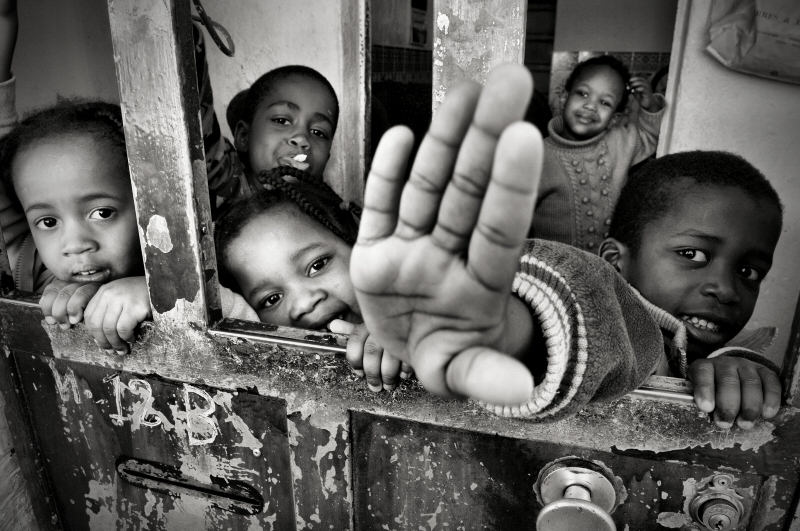
What motivates you to photograph the streets? First of all I like People: real People. Second, I am always looking for THE moment, I never captured and, probably, I will never find. Third, I like low light conditions – rainy days and problematic places.
Usually I walk on foot about 10, 15 to 20 kms a day… walking, talking with strangers, photographing what I can and what I feel. Sometimes it’s easy, other times not.
Many times I repeat the route. It is always different in-spite of being the same…the people always change as well as situations, lighting, sounds … It is and it will always be a challenge to try to make something different when exploring the same places. It’s fundamental to be innovative in the same spots. The “glance” the “way to see” must be creative every day. It’s a challenge, not only for me, but for everybody who also shoot at “my” favorite places… I am always hoping that someone can see something I never saw in my usual spots. Creativity is so important, isn’t it?
My type of photography is a little bit solitary. But I always feel accompanied by the world that surrounds me.

Is Street Photography an obsession? Completely. It’s a way of life… my way…
Are you a lone shooter or do you like shooting with friends or a group? For me street photography is a solitary task. I can’t do it in groups. I always do it alone.
I am often invited to be with more people. When we talk, they are surprised to find out I don’t have my camera. I tell them I have to concentrate and not talk when I photograph. So when I am with them I am also equally as concentrated to talk to them.

I also like to walk into dangerous places. If I go with other people I can’t predict how others will react in situations. I had experiences with foreigners who want to walk with me and things became complicated. I recall one interesting visit from a guy who lives in England. He came to Lisbon to meet me. He asked if I liked dangerous places and if I could take him there. So I took him there .. to a “not very dangerous place”… He was scared and shaking all the time…
Are you an invisible photographer or visible? Many times you must be invisible. Be part of the scenery…this will allow you to be more aware of what’s going on. It allows you to recognize any kind of problematic situations. Hopefully none. But you never know. Other times you have to establish a fantastic connection with “street People”, talking with them, hearing them, respecting them.

I just want to say, we are here to learn and you have to share what you learn – it is the way. It is the only way to grow up. If people are too confident then they never grow as a person. It happens with everyone everywhere. In my data processing days I talked IBM, UNIVAC (Unisys), ICL languages. In order for others to learn this new language from me, I had to write down my experiences. I had to in order to share. People who left my company would leave no instructions. So it was difficult to correct errors. Just like in life- you have to share, analyze the experience. Compare notes. And you have to love people. I can’t accept those who don’t like people on the streets. It’s impossible! You can’t be a street photographer for more than one or 2 hours max. I know some of these people. I call them street shooters. They shoot everything that moves- they don’t think about the emotions.
Favorite street photography city: Lisbon and Paris.

What inspires your photography? The work of photographers I admire and the People.
Is there a philosophy, concept or aesthetic behind your compositions that you apply to your photos? Of course! Everybody reflects his own personality in the Art they can produce. Photography is a reflection of our souls, of our way of being in this world and our own individual aesthetic sense.
Can you describe your style? Your aesthetic? I don’t know if I can describe it. I think others can describe better than me. Only thing I can say, I’m always searching for the special moment. I don’t like to shoot just to shoot. Sometimes in my sleep, I dream about a special framing of a place where I go many times. I see a composition I never saw before. Then I go to the spot of my dream the following day. It turns out weird and surreal.
Lisbon is a very beautiful and small town with a special light. It’s challenging to see something new when you walk the same places all the time. I repeat the same route day after day. But it always looks different.
I do think when it comes down to it, photography is a challenge to yourself. It is self portraiture.
What do you look for in a good photograph by others? As in any piece of Art: emotion. I don’t have to explain why I like some photograph. For me it is enough to be emotionally affected, to feel all my senses revving up… and chills in the body.
Can you describe the entire process of photographing these photos, from preparation to when you pressed the shutter button? For me, this is a very emotional photograph (below). I do not know the old man. He is a very poor man who collects pieces of paper to sell afterwards. He is rather famous in this particular area, because everyone would say he is a bad man. At first I was a afraid to photograph him, but I could not resist. Then I saw how the dog loved him and vice versa. I took 3 shots even though I thought maybe it would be my last photograph. At the time I was thankful he didn’t see me.

This area is called Cacilhas where the river is in the middle. I went back with a print for him and discovered he had died. I found the family and gave them photograph. They cried. This kind of situation happened to me many times, especially when I photograph old people.
As for the composition, I can tell you the area in itself is not beautiful. It’s difficult to shoot as here is only the wall. At the time I instinctively knew how to frame it and shoot it. I have never thought about it until you asked me. Now that we are talking about it, the man on the right made the composition although the emotion speaks for itself. Up until now, something made me push the button.
How do you go about shooting a street photograph? I have my favorite spots, as everybody has, I am sure. The composition is very important as well as to get “THE” moment framed in a composition that attracts me.
I try to present myself the little scenes of the streets in which the people and the typically southern urban environment built by the people, form a perfect unity. Cobbles, walls made of stone, graffiti, children playing carelessly, old people reading newspapers or playing cards, etc.. In my photographs I present all people as unique and the most important part of my photographs. I try to gain an insight into their feelings, and thoughts with the help of their gestures, motions…
How do you choose your shots when you edit? What tells you that the shot is good? First the image must attract me provided it has achieved the following aspects: It has to be emotional, the lighting has to be just right, the composition is perfect and there is a story behind it. I usually shoot during the day. While at night, I look over the photographs. I give a quick look and try to choose one or two that I like more over the others. To be honest I have some thousands of photos I have never seen.
Best 3 tips for shooting the streets:
Always be alone.
Always be concentrated.
Always try to anticipate the moment.

Best single advice on how to improve your work: Always carry the camera and use it. Always be very critical with yourself.
Best single advice on how to edit your work: Less is more…
Best single advice for someone who wants to get into street photography: Choose a project and never forget: Love and respect People.
What’s the best moment in your street photography career? The most important is the friendship and respect I feel everyday from the occasional “street models”. Usually I try to give the photographs I made before to the people I photograph.
Besides this I think it was very important here in Portugal that my first and only book “Street Photography” book was the winner of the award of Authors 2011, sponsored by the Portuguese Society of Authors in audio-visual category, for the “Best Work of Photography”.
What’s the worst moment in your street photography career? When I arrive home and I don’t like any photograph made during the day.
What projects are you working on? I have always a sociological interest on my street “work”. I am involved in some social projects in problematic neighborhoods of Lisbon. I always look for real People and I learn a lot everyday with the anonymous people in the streets.
Where do you want to be in 5 years with regard to street photography? In this world, doing exactly the same I am doing now, so help me my legs…
Are there exhibitions planned in the future? Maybe, if my sons and my girlfriend will oblige me…
Leica Liker thanks Rui for sharing his experience and inspirational advice with us. We look forward to checking in with him in the future.
You can check out Rui’s gear in “Liker Bags’n Gear” here.
This is Rui’s self portrait.
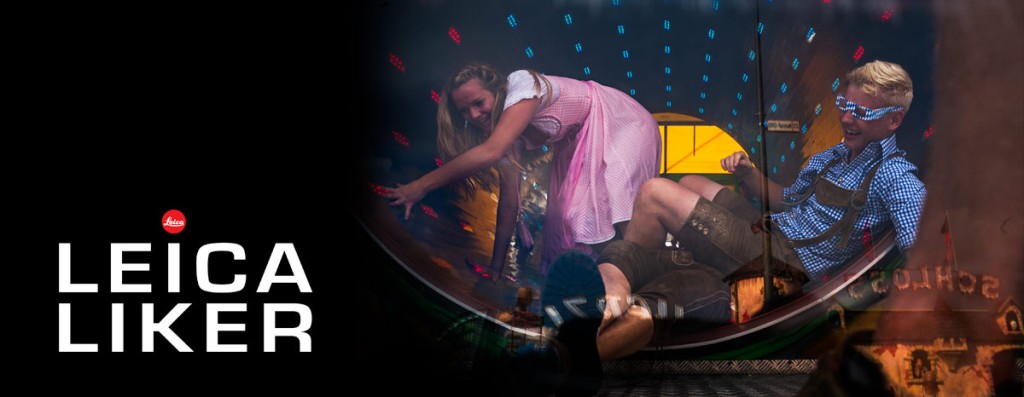








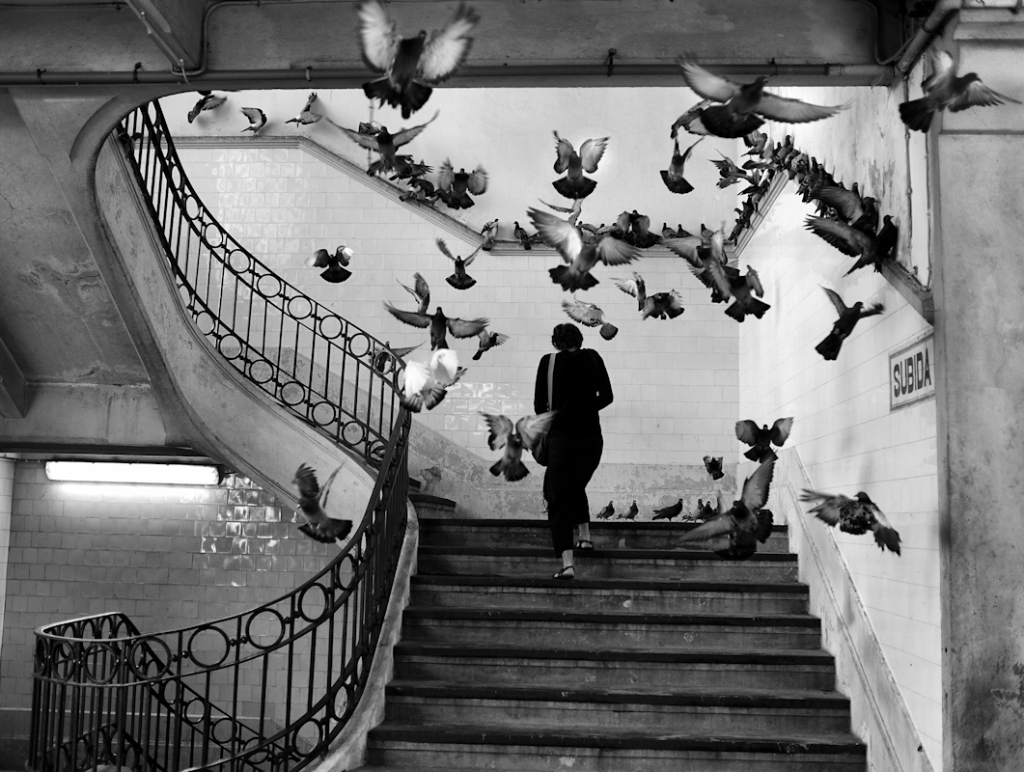
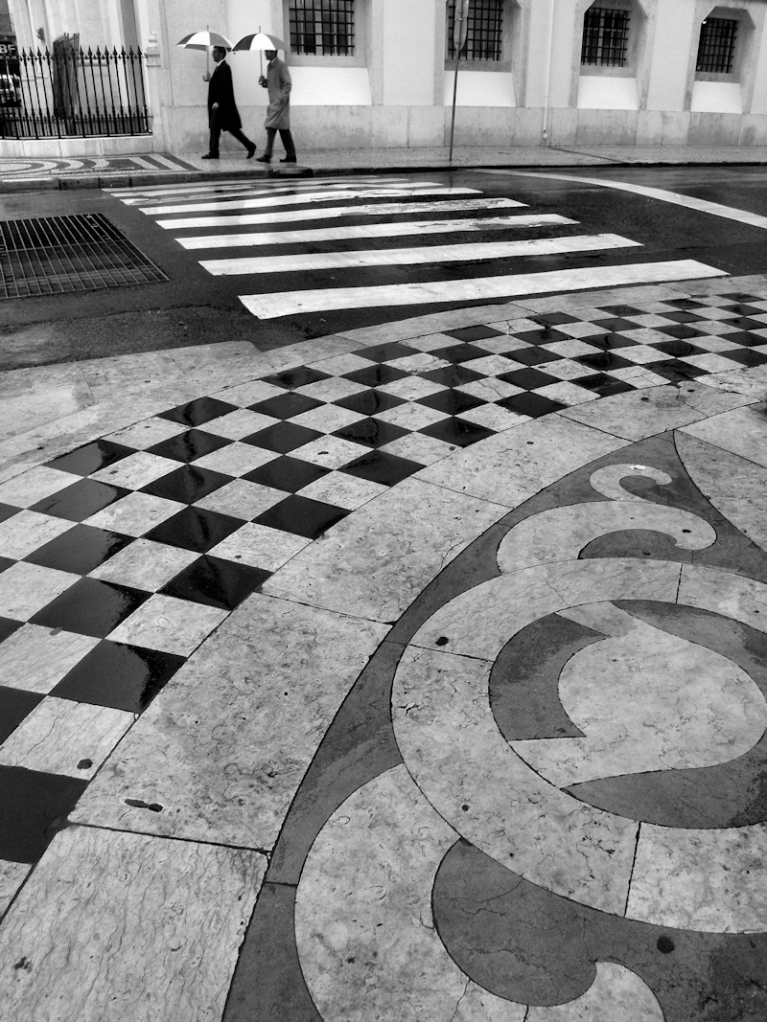

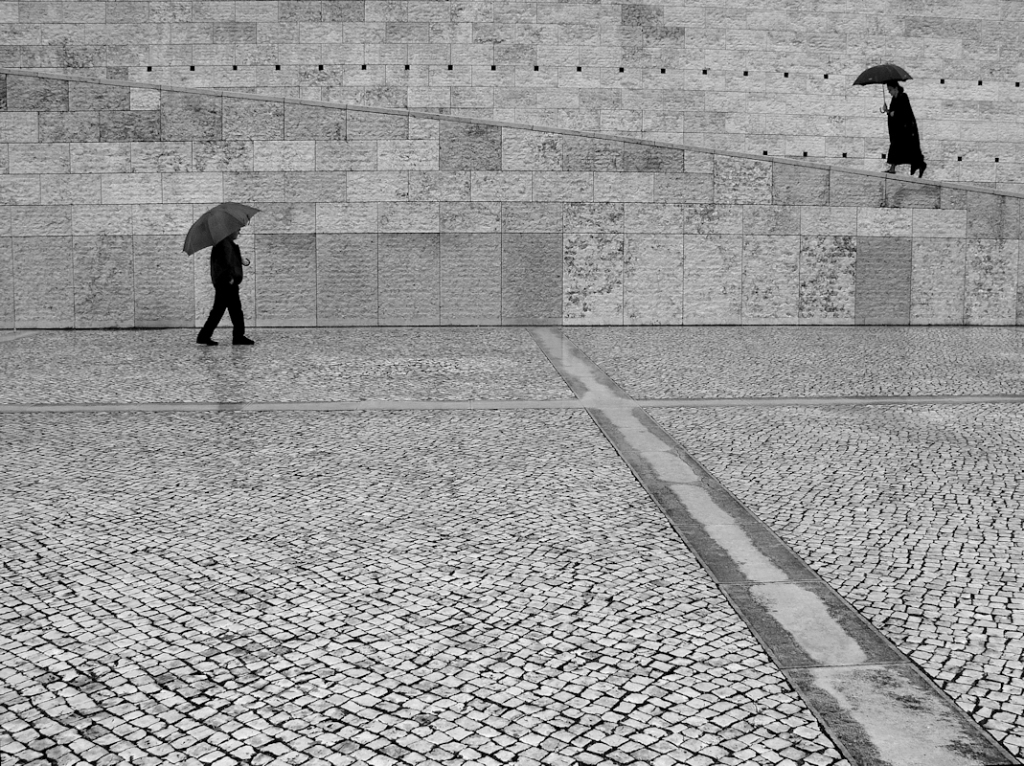



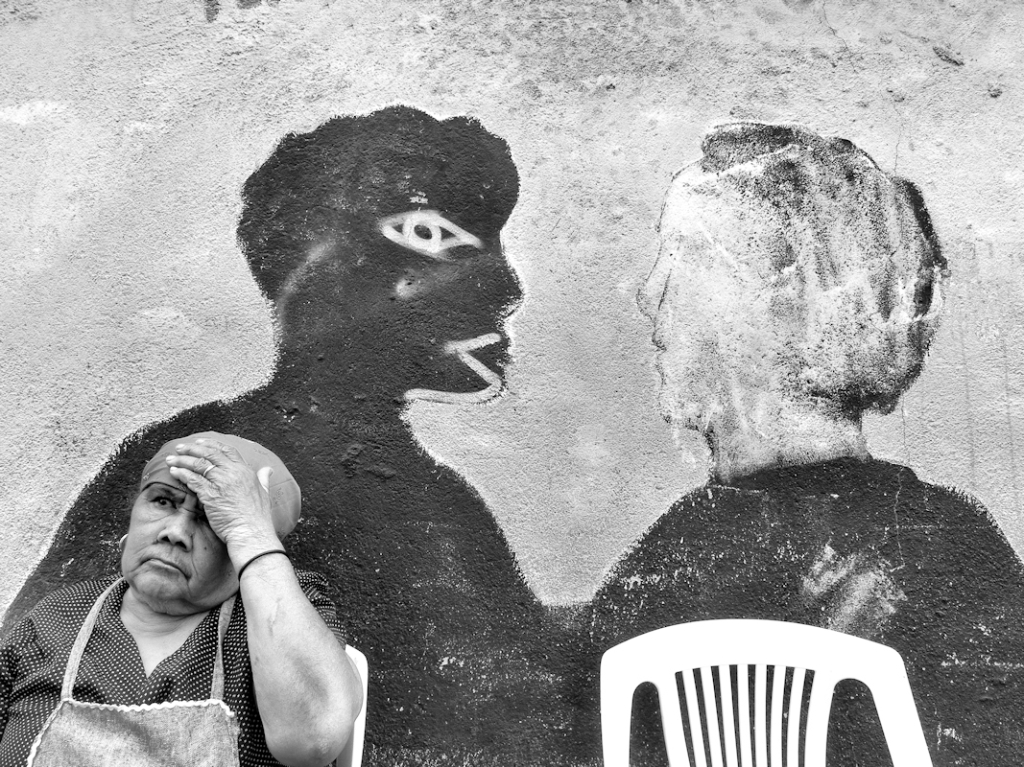






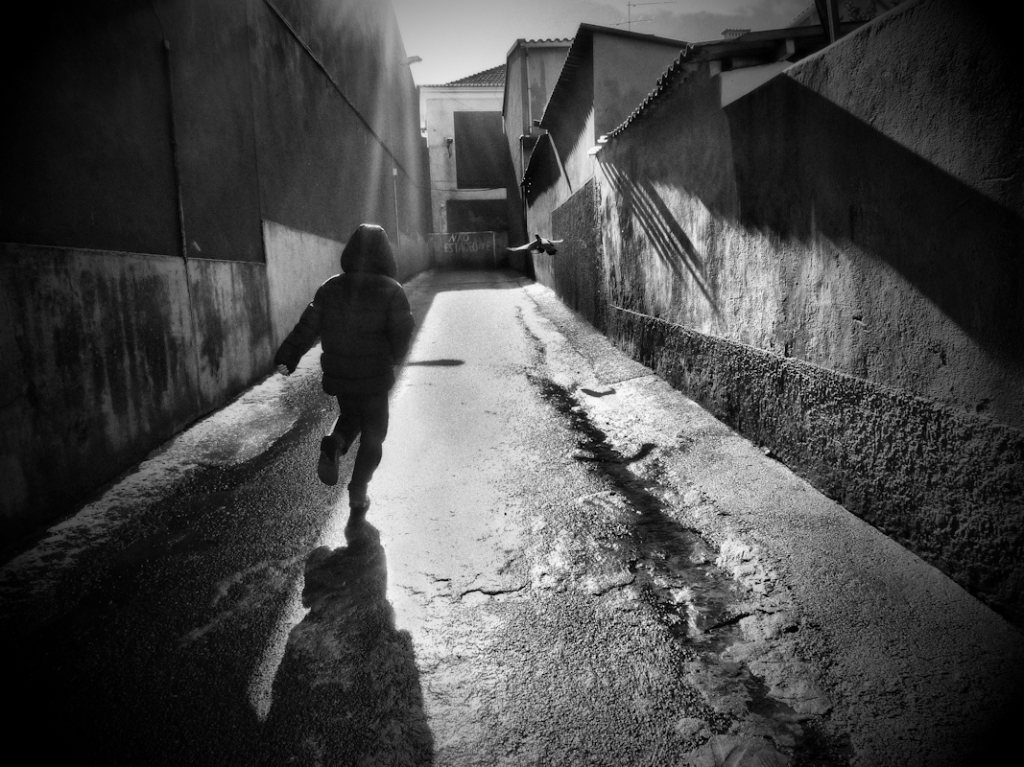






![Rui RX1[7]](https://leicaliker.files.wordpress.com/2013/08/rui-rx17.jpg?w=600&h=400)









